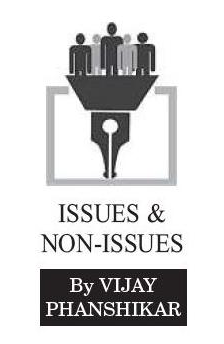A Great Moment!
| Date :27-Mar-2021 |

“Happy my first foreign visit after COVID-19 pandemic onset will be to our friendly neighbour Bangladesh with which India shares deep cultural, linguistic and people-to-people ties,” said Prime Minister Narendra Modi in his departure statement. The Prime Minister noted that he was visiting Bangladesh on the invitation of Prime Minister Sheikh Hasina. He will also call on Bangladesh President Abdul Hamid. ...
THE historicity of Prime Minister Mr. Narendra Modi’s current visit to Bangladesh cannot be missed from many points of view. For, it signals one more positive push to the friendship between India and Bangladesh.
But more importantly, this occasion invites everybody to re-visit the wonderful zone of nostalgia woven around the political tumult of those years when India helped in the creation of an entirely new country, when history put its indelible stamp of truth that the most unnatural Partition of India sought to defy, when the Pakistan experiment recorded its worst failure as it could not hold itself together -- due to its brazenness about its own incompetence, when Destiny’s tryst got a positive twist endorsing India’s superior conditioning and better inheritance of right democratic and cultural values plus political maturity through ages!
The historic event of creation of Bangladesh fifty years ago did not mark only one point in time, but indicated how developments over nearly a quarter of a century since the formation of Pakistan (and possibly earlier as well) peaked to a moment of fruition of the aspirations of an ethnic community that did not fall in line with the political logic with which Pakistan was formed. Through the fraudulent Islamic dogma that dominated the discourse in Pakistan, that ethnic community in the eastern segment fought successfully for its identity.
This is, in the nutshell, the crux of the march of history that preceded formation of Bangladesh!
The rulers of Pakistan mostly belonging to the western segment kept indulging in near-deliberate blunders one after another for years to ensure that the ethnic Bengali population of East Pakistan could not assimilate itself with the persona of the newly formed State. The rulers from the West denied the Bengali ethnicity its own right to assert itself through language, through culture, through socio-political and economic aspirations. But when they went to the extent of denying the Awami League led by Sheikh Mujib Ur Rehman the rightful opportunity to form the Government despite its landslide victory in general election, the tipping point came.
That is when and where India came into play as the ragged and tortured Bengali ethnicity sought refuge in India’s traditional hospitality. The details of the developments thereafter are well known in public domain. Prime Minister Mrs. Indira Gandhi asserted herself as a leader with vision and put her stamp on the developments of those tumultuous days. She realised that it was going to be India’s moment of rare opportunity to teach Pakistan a lesson it would never forget. In the process, Mrs. Indira Gandhi used all the resources the country had, including the military power, and ensured that the ethnic Bengali majority of East Pakistan asserted itself to form its own nation -- Bangladesh.
Those developments also indicated how Pakistan misread every turn and twist of events. As its military mounted cruel attacks on the Bengali population of East Pakistan, its also sought to threaten India of dire consequences if it tried to step in. In that brazen but foolish ideology, Pakistani Armed Forces mounted attacks on eleven of India’s airbases along the borders. Never did the Pakistani rulers realise that they were only inviting India to step in.
What followed was nothing but a sharp, well-directed military resposte` by India. That 13-day war, one of the shortest of its kind in human history, led to creation of a country. And that campaign -- led by the legendary General (Field Marshal) Sam Manekshaw and supported by brilliant cadre of officers across the three services of Army, Navy and Air Force -- created so many firsts that military historians and strategists of every country across the world undertake a deep study of its details on a regular basis as part of their refurbishment of operational excellence combined by political shrewdness and astuteness of a rare kind.
A point that makes every Indian proud is the fact that the Indian leadership -- political or military -- never shied away from admitting its role in the formation of Bangladesh. Through official statements, in books recounting the developments around formation of Bangladesh, through interviews to the media or researchers, the larger Indian leadership did not do anything to hide its participation in the struggle for freedom mounted by the ethnic majority of what East Pakistan, which now is Bangladesh.
This assertion of the national resolve is a wonderful point of post-Independence India. For, it vindicated the wisdom of those who opposed Partition -- that Pakistan would be doomed to fail on account of its own blunders. In fact, nobody in India favoured Partition, including those accused for having agreed to the British Partition Plan. In those moments of extreme national anxiety, many leaders tended to say ‘yes’ to Partition with the basic idea that the alien rulers would be out and the cantankerous exponents of Two-Nation Theory based on religious demography would have their own quarters to mess up with, leaving the rest of the country to sanity of good governance.
Fifty years later, all these memories now storm back into India’s national consideration!